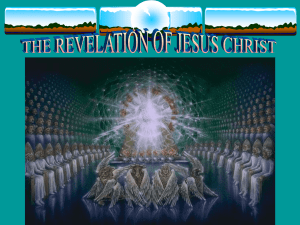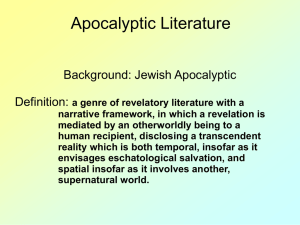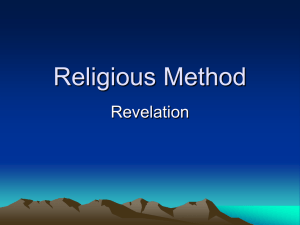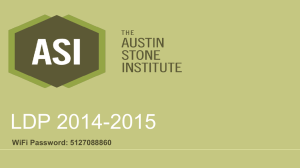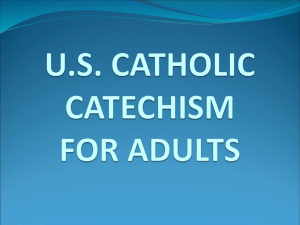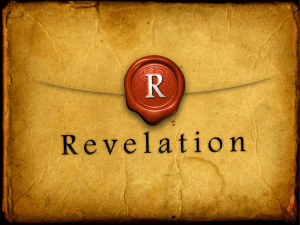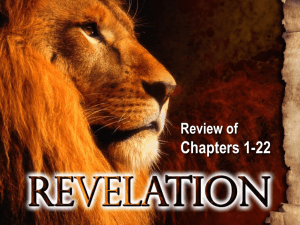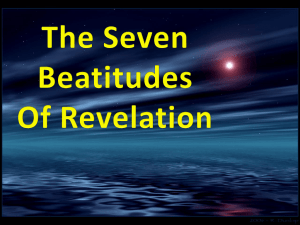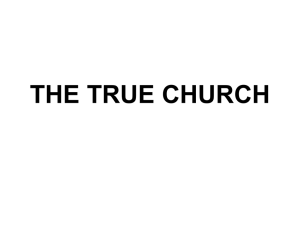In Revelation - Eastside Church of Christ
advertisement
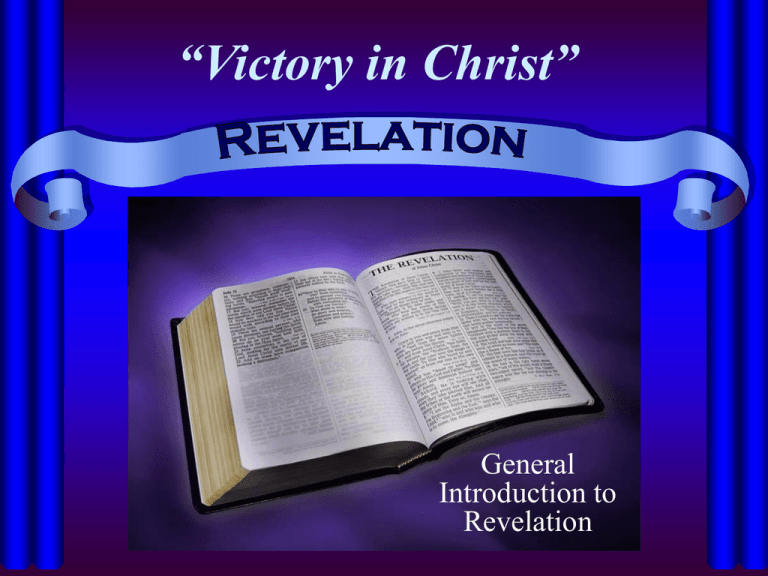
“Victory in Christ” General Introduction to Revelation Recommended Study Guides The Book of Revelation Lessons by Steve Klein Revelation -- “Victory in Christ” By Robert Harkrider A Study Outline of Revelation By James M. Booth Available free at www.padfield.com “Victory in Christ” General Introduction to Revelation Attitudes Toward Studying Revelation • The beginning and end are useful, but the middle is hard to understand, and therefore we can pass it by. “It doesn’t effect my salvation, therefore it is not important.” • It primarily describes current events and the end times. It can be used to prove many theories. • It is God’s word. I should try to learn it, understand it and keep it. – “Blessed is he who keeps the words of the prophecy of this book." (Revelation 22:8) The Name and Nature of the Book • “Revelation” is from the Greek word Apokalupsis, meaning “an uncovering” – “…things hitherto withdrawn from view are made visible to all.” (Thayer) • Apocalyptic Literature – A style of writing common in Hebrew literature (e.g. Ezekiel, Daniel, Zechariah, etc.) – Relies on dramatic visions and images to convey its message. – Frequently used in troubled times. A Series Of Apocalyptic Images Designed to… • Warn the Church • Warn the Enemies of the Church • Give comfort and hope to God’s people. For the purpose of showing that… • God is in control. His power is far greater than any dark power of this world. He WILL BE victorious, and those who are with Him shall overcome! (Rev. 17:14) Theme Verse “These will make war with the Lamb, and the Lamb will overcome them, for He is Lord of lords and King of kings; and those who are with Him are called, chosen, and faithful.” – Revelation 17:14 Destination, Author & Date Written to the seven churches of Asia (1:4) • 7 is a symbolic number; there were actually many more churches in Asia at the time (e.g. Troas, Colossae, Hierapolis) • These seven represent all churches. Written by the inspired apostle John • The writer identifies himself as John (1:1, 4, 9; 22:8). • Internal and external evidence, as well as historic tradition, point to John. Destination, Author & Date Probably written about 94-96 A.D. • Domitian was emperor during this time – Emperor worship was compulsory, and those who did not comply were banished, persecuted or killed (Revelation 1:9; 13:8, 12, 15-17) • The Roman culture of this time was characterized by immorality, extravagance and idle pleasure. • Christians were overtly persecuted and pressured to compromise their faith and morals. Why Not Accept an Earlier Date? Some suggest an earlier date for of 65-68 • External evidence is stronger the later date 95-96Nero’s A.D. --reign. Reliable from A.D. of during Theywriters see Rev. 17 180-325 A.D.the ascribe the latter date. as foretelling destruction of Jerusalem • Internal evidence supports a time when the church was threatened worldwide by political and religious forces. • Similar O.T. prophetic scripture is descriptive of the Roman conflict with the church (Daniel 7:17-28) • The woman on the Beast in Revelation 17:18 fits better with Rome than with Jerusalem. The Use of Signs and Symbols Revelation is filled with visions of symbolic objects and numbers. Some concepts associated with numbers… – – – – – – – One: Unity or uniqueness Two: Strength or firm testimony Three: Deity (Father, Son, Holy Spirit) Four: The inhabited earth (4 directions, etc) Seven: Complete, a full picture Ten: Complete (with respect to human effort) Twelve: The people of God (12 sons, tribes, apostles) – One Thousand: A large number – Six: Falling short of complete Various Approaches to Interpretation Futurist (premillennial) Contradicts clear statements in the text (Revelation 1:1, 3; 22:6, 10) Continuous Historical – unfolding future history (Catholicism > Reformation > etc.) Philosophy of History -- generally descriptive of how God deals with man in every age. Preterist (completed or past) -- the events described have already happened. Historical Background -- written to people in a specific historical context to help them deal with issues current to them. Old Testament Images In the Book of Revelation Revelation is a SHOW! • “The Revelation of Jesus Christ, which God gave Him to show His servants; things which must shortly take place. And He sent and signified it by His angel to His servant John.” -- (Revelation 1:1) • The Greek word (δεικνύω) translated “show” here means literally “to expose to the eyes.” – It can also be used metaphorically “to give evidence or proof of a thing, to show by words or teach” (Thayer’s Greek Lexicon). – The meaning in Revelation 1:1 appears to be fairly literal. The Revelation was Originally Communicated in Images John is repeatedly shown images in visions. (4:1, 17:1; 21:9-10; 22:1; 22:6) “What you see, write in a book send it to the seven churches which are in Asia.” (Rev. 1:11-12) The phrase “I SAW” occurs 36 times in Revelation 1:12 -- “I saw seven golden lamp stands” 1:17 -- “And when I saw Him” 4:4 -- “I saw twenty-four elders” 5:1 -- “And I saw in the right hand of Him who sat on the throne a scroll” 5:2 -- “Then I saw a strong angel” 6:1 -- “Now I saw when the Lamb opened one of the seals” 6:9 -- “I saw under the altar the souls of those who had been slain…” 7:1 -- “I saw four angels” 7:2 -- “Then I saw another angel ascending from the east” 8:2 -- “And I saw the seven angels who stand before God…” 9:1 -- “And I saw a star fallen from heaven to the earth.” 9:17 -- “And thus I saw the horses in the vision” 10:1 -- “I saw still another mighty angel coming down from heaven, 10:5 -- “The angel whom I saw standing on the sea and on the land 13:1 -- “And I saw a beast rising up out of the sea” 13:2 -- “the beast which I saw was like a leopard…” 13:3 -- “And I saw one of his heads as if it had been mortally wounded…” The phrase “I SAW” occurs 36 times in Revelation 13:11 -- “Then I saw another beast coming up out of the earth” 14:6 -- “Then I saw another angel flying” 15:1 -- “Then I saw… seven angels having the seven last plagues” 15: 2 -- “And I saw something like a sea of glass 16:13 -- “And I saw three unclean spirits like frogs …” 17:3 -- “And I saw a woman sitting on a scarlet beast…” 17:6 -- “I saw the woman, drunk with the blood of the saints…” 18:1 -- “I saw another angel coming down from heaven” 19:11 -- “Now I saw heaven opened, and behold, a white horse” 19:17 -- “Then I saw an angel standing in the sun” 19:19 -- “And I saw the beast, the kings of the earth, and their armies” 20:1 -- “Then I saw an angel coming down from heaven” 20:4 -- “And I saw thrones” 20:11 -- “Then I saw a great white throne” 20:12 -- “And I saw the dead, small and great 21:1 -- “Now I saw a new heaven and a new earth 21:22 -- “But I saw no temple in it” Revelation is Steeped in References to the Old Testament Most of the images have OT antecedents. Of the 404 verses in Revelation, 278 contain references to the Old Testament (cf. H.B. Swete, The Apocalypse of St. John) “…the book of Revelation makes use of allusions from 24 Old Testament books” but, “the majority of the allusions are from six or seven books. Out of 348 Old Testament quotations and allusions in the book, 282 are to be found in the following seven books: Exodus, 22; Psalms, 43; Isaiah, 79; Jeremiah 22; Ezekiel 43; Daniel, 53.” (Ferrell Jenkins, The Old Testament in the Book of Revelation, p. 49) Distribution of Old Testament Quotations and Allusions BOOKS NUMBER BOOKS NUMBER Genesis Exodus Leviticus Numbers Deuteronomy PENTATEUCH 13 27 4 3 10 57 Isaiah Jeremiah Ezekiel Daniel MAJOR PROPHETS 79 22 43 53 197 Joshua Judges 2 Samuel 2 Kings 1 Chronicles Nehemiah HISTORICAL 1 1 1 6 1 1 11 2 8 9 1 2 15 1 38 Psalms Proverbs POETRY 43 2 45 Hosea Joel Amos Habakkuk Zephaniah Zechariah Malachi MINOR PROPHETS -- adapted from Merril C. Tenney, Interpreting Revelation The Old Testament Images Found in Revelation are of Two Types: 1. Those that draw from OT historical events, people, places and things (e.g. lamb, horn, altar, harps, Jezebel, Jerusalem, the River Euphrates, the Temple, Armageddon, the overthrow of Babylon, etc.) 2. Those that draw from the symbols or Apocalyptic Visions of the OT (e.g. four horsemen, sealing of the servants of God, the throne scene, four living creatures, etc.) Compare and Contrast! A BIG KEY to understanding Revelation is in noting the similarities AND differences between the images in Revelation and the Old Testament images. Effective Study of the Book of Revelation Involves: • Becoming very familiar with the text of Revelation enabling one to use the mind’s eye to SEE the images John describes. • Researching the connection between the images in Revelation The Lamb Isaiah 53:7; Revelation 5:6 • The lamb is slain for our sins, as Isaiah indicates, but in Revelation the slain Lamb lives! The images of 7 horns and 7 eyes reveal His omnipotence and omniscience. Armageddon (Mt. Megiddo) • In the OT, a place of conflict between God’s people and their enemies (Judges 5:19; 1 Kings 9:15; 2 Kings 23:29) Armageddon (Mt. Megiddo) In Revelation Armageddon is the scene of ultimate conflict between the forces of the Dragon and the forces of the King of Kings. The Tree of Life In the OT, a tree in Eden from which mankind was separated because of sin (Genesis 2:9; 3:22-24). In Revelation, saved man regains access to the tree of life (2:7; 22:2, 14). The Throne Scenes Ezekiel 1; Revelation 4 The two scenes share several common images – both have four multi-winged creatures before a bright throne of One who is worshiped. Each vision includes a number of things that the other does not. Four Living Creatures Ezekiel 1; Revelation 4 • The creatures in Ezekiel each have four faces like a man, a lion, an ox and an eagle. • In Revelation, the creatures have but one visage each – the first like a lion, the second like a calf, the third like a man and the fourth like and eagle. Four Living Creatures Ezekiel 1; Revelation 4 In Ezekiel, the creatures are accompanied by wheels full of eyes (omniscience) which In Revelation, each creature has is full of enabled them to go eyes, suggesting “wherever the spirit wanted complete omniscience. to go” (omnipresence). The four horsemen of Revelation 6, resemble the four horsemen of Zechariah 1:8 and the four chariots of Zechariah 6:1-8, although the color and order of appearance of the horses is different in each case. The number four appears to suggest coverage of the earth. Two Olive Trees The two witnesses of Revelation 11:2-12 are said to be “the two olive trees and two lamp stands,” calling to mind the vision of Zechariah 4. Horns are Used Throughout Revelation as Symbols of Power and Dominion In Revelation 12 & 13, the Dragon, the Sea Beast and the Land Beast all have horns, as did the fourth beast of Daniel’s vision in Daniel 7:7 Effective Study of the Book of Revelation Involves: • Using the mind’s eye to SEE the images John describes. • Researching the connection between the images in Revelation and similar images in the Old Testament.
